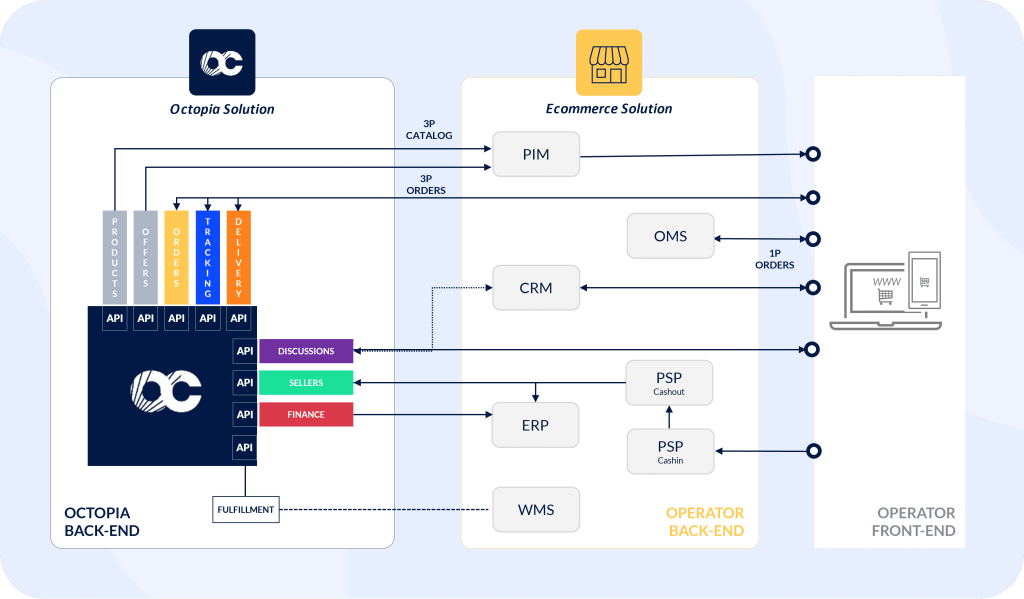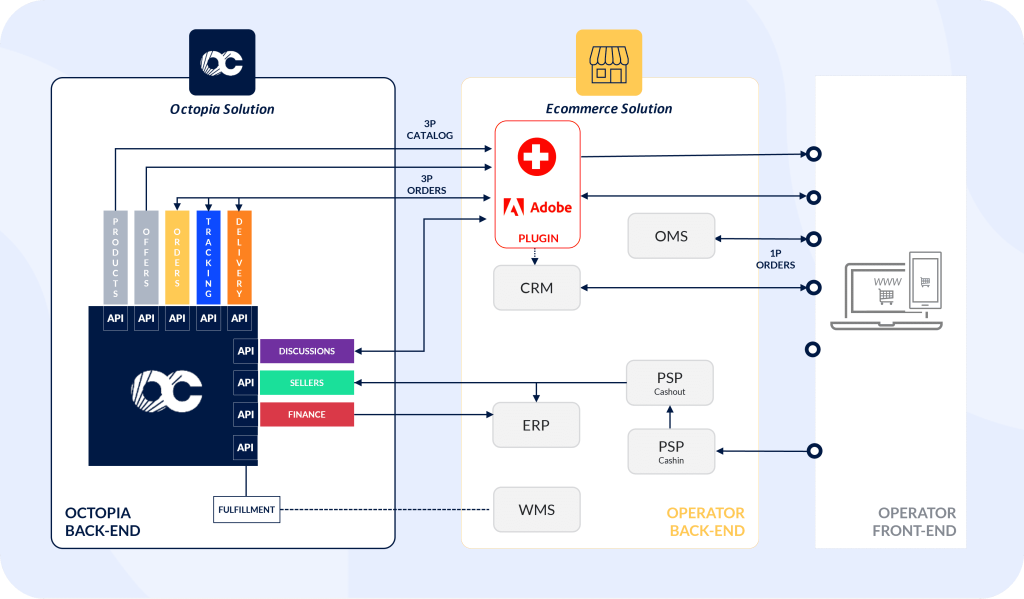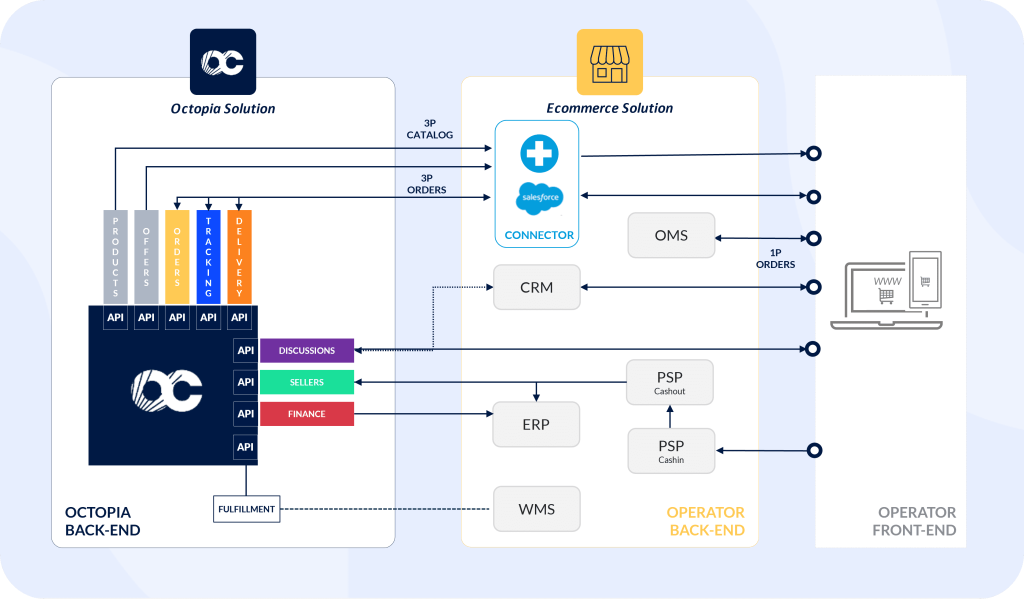When you operate an existing e-commerce site and want to develop a marketplace, integrating it into your existing IT architecture can be a major challenge for many businesses. This key stage, often perceived as complex and time-consuming, requires a considered approach and appropriate technological solutions.
To successfully integrate a marketplace solution, it is essential to put in place mechanisms for interconnection, interoperability and secure information exchange.
In this article, we explore the main integration options for solving this problem:
1) APIs (Application Programming Interfaces)
2) The Adobe Commerce plugin (Magento CE and EE)
3) The Salesforce Commerce Cloud connector
While each of these options offers a relevant response to the problem of marketplace integration, we’re going to take a closer look at how they work and their advantages, so that you can choose the solution that suits you best.

Option 1: APIs – a universal solution
Whatever your current e-commerce solution, APIs make it easy to share and integrate the functionality of new applications into existing software systems, thanks to a universal and simplified programming language. APIs enable independent software applications to communicate, interact and exchange data automatically and reciprocally, whatever the programming language used.
To function properly, the API must be able to provide a request that is compatible with different application platforms such as Android, Apple or Windows. So, to enable users to send an intelligible and comprehensible request to software with a different environment, APIs rely mainly on two defined communication architectures: SOAP (Simple Object Access Protocol) or REST (Representational State Transfer). SOAP is a highly structured protocol that sends requests formulated in XML and receives messages via HTTP or SMTP. REST is a style of architecture, not a protocol, that allows applications to exchange data in several formats. The REST (or Restful) API is now the most widely used, offering greater flexibility and scalability. Finally, the RESTful API, based on a set of recommendations, is faster than the SOAP architecture.
The advantages of APIs developed by Octopia
At Octopia we have developed REST APIs to interconnect your systems, regardless of the solutions you use, with our marketplace solution, allowing you to exchange information easily and quickly.
Resilience
Octopia is based on the technological know-how of Cdiscount, France’s largest marketplace for over 12 years. For example, the robust and proven solution is capable of handling more than 3,000 requests per second on the Orders API and can therefore withstand high peaks in activity, such as during major commercial events, with more than 165,000 orders per day and up to more than 350 orders per minute.
Architecture
The solution is based on the latest market standards, with an 8-point RESTful API architecture:
- Seller: collect information on sellers
- Reference: count and extract product categories and attributes
- Catalogue: count and extract products and offers
- Order: create new orders and view existing ones
- Discussion: manage messages between customers, sellers and operators
- Tracking: retrieve tracking information and status
- Delivery: configure and filter regional delivery zones
- Finance: retrieve invoices and financial data

Architecture with Octopia API
The RESTful API architecture provides greater flexibility and independence. It is scalable and enables software and applications to be improved efficiently. The RESTful API, based on a set of recommendations, is faster than the SOAP architecture.
Security
The Octopia solution is based on HTTPS and OAuth 2.0 with KeyCloak, complies with the SOC 2 Type I framework and has received ISO-27001 certification. The ISO 27001 Information Systems Security certification guarantees the protection, improvement and performance of the information security management system. SOC 2 type 1 demonstrates the security roles Octopia uses to protect customer data according to 5 trust criteria:
- Security: All systems and information remain protected against risks that would compromise integrity and affect the ability of organisations to achieve their defined objectives.
- Availability: All systems and information remain protected against risks that would compromise integrity and affect the ability of organisations to achieve their defined objectives.
- Integrity: All system processing must provide only reliable information at all times when requested/authorised in order for an organisation to achieve its objectives.
- Confidentiality: Any processing by the system must provide only reliable information at all times when requested/authorised in order for an organisation to achieve its objectives.
- Privacy: Personal information must be managed (protected and/or stored) in a way that enables the organisation to achieve its objectives.
Compatibility
During the integration phase, Octopia aims to save you time and speed up the go-live of your marketplace. This is why Octopia APIs are compatible with many third-party tools that you already use to facilitate the management of your marketplace, such as :
- PSP – Payment Solution Providers
- CRM – Customer Relationship Management
- PIM – Product Information Management
- ERP – Enterprise Resource Planning
- OMS – Order Management System
- WMS – Warehouse management solution.
We will now explore marketplace integration options via the Adobe Commerce plugin and the Salesforce connector. It’s interesting to note that these modules developed by Octopia are both based on APIs, which makes Octopia its first technical user, constantly improving the ways in which it offers its service.
Option 2: Adobe Commerce plugin (Magento CE et EE)
Adobe Commerce, formerly known as Magento, is one of the most widely used open source CMS for creating online shops. The solution is one of the most highly developed e-commerce ecosystems in the world, with over 250,000 merchant users, including major brands such as Nike, Samsung and Ford. Ideal for large enterprises, it can handle large volumes of traffic and offers a wide range of features and customisation options. Adobe Commerce has numerous integrations with a wide range of applications, platforms and services, providing great flexibility for e-tailers.
To enable you to switch seamlessly between your Adobe Commerce e-commerce site and a functional multi-vendor marketplace, we have developed a specific plugin that includes all the necessary functionality for you, your customers and your sellers. The plugin speeds up integration by connecting the APIs for products, offers, orders, tracking, delivery and discussion directly to the plugin. Octopia uses 2 versions: the Adobe Community Plugin (Magento Community version) and the Adobe Commerce Cloud Plugin (Magento Enterprise version).
Our teams have developed back office functions to manage your catalogue more easily, define your product ranges, take advantage of Octopia’s categories and attributes and administer your orders, along with front office functions to enhance your product sheets. The plugin also lets you adjust your preferences (frequency of import/export data updates, data to be used in the front office, etc.).
Our current integrations show that using the Adobe plugin can cut integration time in half.

Architecture with the Octopia for Adobe Commerce plugin (Magento)
Backend features with Adobe Commerce (Magento)
The Adobe Commerce plugin enables automatic backend modifications to products and offers, orders and messages.
Products and offers:
The import of product information and offers from sellers as well as product categories is done automatically with the Adobe Commerce plugin, and you can define the import frequency for catalogue updates. Creating and managing products in the catalogue is made easy with connections between the APIs and the product database. The plugin also allows you to create categories and attributes to enhance the relevance of your site and the effectiveness of your filter and search functions. Our plugin also offers the possibility of creating commercial categorisation rules, which allow you to make your site event-driven by duplicating certain products or categories in event-driven categories.
Orders:
The Octopia for Adobe Commerce plugin enables the automatic export of Octopia orders to sellers and the import of order status and parcel tracking (tracking number and links, delivery promise and dispatch date, etc.).
Messages and sellers:
The Octopia for Adobe Commerce plugin automatically imports the information relating to the sellers selected in your Octopia catalogue, facilitates the correspondence between the type of Octopia messages and your own, and offers you the choice of CRM model (seller-customer or seller-marketplace-customer).
Front-end functionalities with Adobe Commerce
With the Octopia for Adobe Commerce plugin, you can enhance your front-end with the data offered by Octopia.
Product list and details
You can automatically display the characteristics “sold by”, “shipped by”, costs, delivery time and shipping method. The detailed product characteristics provided by Octopia, the sales animation defined by the sellers and information about the sellers are also displayed automatically by the plugin.
Shopping cart and cashout
The Octopia for Adobe Commerce plugin automatically separates 1P and 3P products in the same order and enables you to fine-tune the management of shipments. You can select the delivery method for Octopia products, the display of the delivery date and the seller’s name.
Messages
With the Octopia for Adobe Commerce plugin you can display the delivery date, track packages, open and reply to discussions with sellers. You can also set up automatic e-mail notification to your customers when you receive a new message.
Option 3: The Cartridge Salesforce Commerce Cloud
Salesforce Commerce Cloud is another popular SaaS e-commerce platform, with over 150,000 merchant users, including Coca-Cola, Sony and Calvin Klein. With an intuitive user interface and powerful scripting languages, Salesforce Commerce Cloud is highly scalable, offers automation features and can handle large volumes of traffic. With a system that is updated very regularly, the solution offers a particularly rapid rate of innovation and bug resolution, requiring no maintenance.
If you use the Salesforce Commerce Cloud solution, we have developed a dedicated connector, or cartridge (SFRA version). It speeds up integration by connecting the products, offers, orders, tracking and delivery APIs directly to Salesforce. We estimate that this connector reduces implementation time by around 40% for our customers.

Architecture with the Salesforce Commerce Cloud Cartridge
Salesforce Commerce Cloud cartridge applies the changes to the back-end, leaving you free to exploit your existing front-end or choose from the various front-end solutions on offer.
Backend functionalities with Salesforce Commerce Cloud
Products and offers
The Octopia cartridge automatically imports the information proposed by Octopia, such as products, offers, shipping methods, stocks, prices and associated categories and attributes. You can define the frequency of catalogue updates. The Octopia cartridge provides display attributes, filters and search criteria for the front-end.
Orders
The Octopia cartridge also manages the export of orders to Octopia, from their submission and modification to their status tracking, as well as the tracking information for parcels (tracking number and URL, delivery promise and shipping dates). The Octopia cartridge uses a map of payment methods for better traceability and retrieval of order cancellations, reasons and refund amounts.
Sellers
The Octopia cartridge automatically imports seller details and information and you can define how often seller information is updated.
Easy front-end integration and SFRA compatibility
Integration with Salesforce Commerce Cloud enables categorisation, selection of target categories for import into the catalogue, mapping of cancellation reasons and shipping methods, and customisation of the shopping basket and payment.
Find out more about Octopia’s Salesforce plugin: click here
Expert view
At Octopia we recommend to our customers to work with a trusted integrator to implement the most appropriate integration option. Régis Mongrédien, Solutions Consultant at Smile, shares best practices for selecting one of these 3 options.
“Integrating a marketplace into a complex IT architecture is a key challenge for companies looking to expand their online presence. The three options presented offer their own advantages and particularities depending on the context of the project, but our experience has shown that using the Octopia platform can greatly simplify the integration process.
When you opt for integration via API, it is crucial to follow good development practices, such as securing data exchanges, error management and clear documentation. This approach, which we have chosen for the Bebeboutik project, offers a high degree of flexibility and means that the integration can be customised to meet specific needs.
On the other hand, integration via a Magento plugin offers a robust solution for companies using this e-commerce platform. However, it is important to ensure that the plugin is regularly updated and compatible with current versions of Magento. This is now the case thanks to Octopia’s technology partners. In addition, careful customisation may be required to ensure that the marketplace integrates perfectly with your existing architecture.
Finally, integration via a Salesforce Commerce Cloud plugin can be particularly advantageous for companies that already use this platform. Consistency between the tools can simplify the management of e-commerce and CRM data and provide a seamless user experience. However, careful planning of the design and integration phases is required to ensure a smooth integration.
Our extensive marketplace integration experience has shown us that Octopia offers significant advantages in terms of ease of integration, high quality technical support and scalability to grow with your business. Whichever integration approach you choose, a solution like Octopia can make it much easier to manage and expand your marketplace within a complex IT architecture”.
Conclusion
Integrating a marketplace solution into an existing e-commerce platform can bring its own complications. However, there are a number of options to help you make a smooth transition to the marketplace, while keeping your current solutions.
In short, there are a number of best practices to adopt. If you opt for APIs, make sure they are reliable, secure and efficient. If you currently operate your e-commerce site with Adobe Commerce or Salesforce Commerce Cloud, using a custom-developed plugin will speed up your integration.
It’s also key to work with recognised experts who can advise and support you throughout your project, so you can choose the integration that’s best suited to your needs and your organisation.
Whichever option you choose, Octopia is committed to simplifying the integration process, guaranteeing data security, and ensuring seamless interoperability within your IT architecture, with solutions tailored to accelerate your transition to a marketplace.
In addition, Octopia offers personalised support throughout your project. Our multi-disciplinary pre-sales team will share with you the various key success factors of a marketplace and allow you to discover, test and experiment with the solution in a practical way (find out more).
In addition to our technological and functional expertise, Octopia supports you in your integration and overall digital transformation. Our team guides you in defining your MLP (minimum lovable product) and your priorities. During the various integration phases, our team offers workshops and training to help you adopt this transformation with all the necessary knowledge specific to the marketplace model.
Discover more about SOC2 or the ISO 27001 Information Systems Security certification.
Contributers:
Régis Mongrédien, Solutions Consultant at Smile
Axel Auberger, Product Manager at Octopia
Eric Thouvenin, API Manager at Octopia
Laurent Bailly, Solution Consulting Manager at Octopia
Laura Vigneron, Product Marketing Project Manager at Octopia
